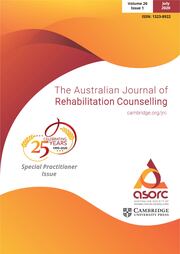Article contents
The Rehabilitation Needs of Adult Siblings of Persons With Traumatic Brain Injury: A Quantitative Investigation
Published online by Cambridge University Press: 15 October 2015
Abstract
This study examined the post-injury rehabilitation needs of 158 adult siblings of persons with traumatic brain injury (TBI) in the United States. The mean age of participants was 37.0 years (SD = 10.0 years), and their ages ranged from 19 to 72 years. A total of 120 (75.9%) of the participants were female. Participants completed the Family Needs Questionnaire (FNQ) (Kreutzer, 1988), which measures the unique needs of families following TBI. The FNQ counts the types of needs rated as important and the frequency in which those needs have been met. Data were analysed via hierarchical multiple regression analysis with the number of met needs set as the outcome variable. A total of 15 predictor variables assessed direct and indirect markers of caregiving related stresses corresponding to position in the Pearlin stress process model. Participants indicated that health information was the most important need while needs for involvement with care were the most often met. Results also indicated that participant feelings of more restrictions in valued family activities and perceptions of greater cognitive-behavioural impairments with their injured siblings were associated with lower number of met rehabilitation needs. Participants reported that the use of effective coping behaviours and access to social support were associated with higher numbers of met rehabilitation needs. Findings suggest adult siblings share similar needs to parents and spouses (i.e., the most common primary caregivers) and require professional attention and support following TBI.
- Type
- Articles
- Information
- The Australian Journal of Rehabilitation Counselling , Volume 15 , Issue 1 , 01 March 2009 , pp. 12 - 27
- Copyright
- Copyright © Cambridge University Press 2009
- 9
- Cited by


